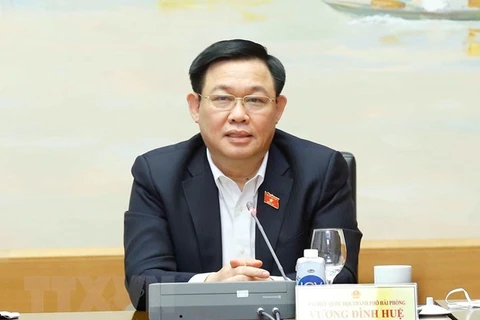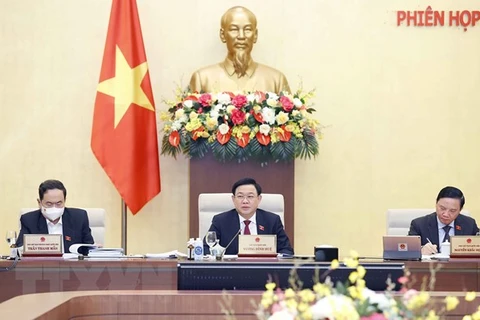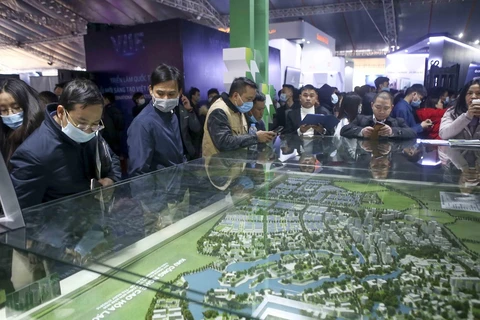Hanoi (VNA) - In the context of increasingly intensive international economic integration, the State needs to take effective measures to protect intellectual property rights, especially for goods purchased and sold via e-commerce channels.
 Vietnamese businesses need to raise awareness of intellectual property in the context of global integration (Photo: Vietnamplus)
Vietnamese businesses need to raise awareness of intellectual property in the context of global integration (Photo: Vietnamplus) This was among recommendations given by experts at a seminar to launch a report on economic reforms for effective intellectual property protection in the context of economic integration and digital transformation in Vietnam that took place in Hanoi on March 24.
The event was held by the Central Institute for Economic Management (CIEM) and the Australia-Vietnam Economic Reform (Aus4reform) Programme.
The report updates regulations on intellectual property protection in Vietnam; reviews and analyses commitments on intellectual property in a number of international treaties of Vietnam, especially in new-generation free trade agreements; and recommends policies for amending and supplementing the Law on Intellectual Property.
It also focuses on analysing requirements for completing regulations on intellectual property protection in Vietnam to support digital transformation; challenges to amending regulations on intellectual property protection in line with international commitments; and proposing economic innovation orientations to strengthen intellectual property protection in the country.
“International economic integration requires Vietnam to continue to reform, especially improving the legal framework on intellectual property protection,” said Director of CIEM Tran Thi Hong Minh.
She emphasised that the amendment and supplementation of laws on intellectual property is not only necessary for international integration but also for the country's digital transformation.
Intellectual property yet to receive due attention
According to Minh, Vietnam is looking for a new growth model for the economy, focusing on promoting innovation and increasing the application of science and technology to create a new driving force for economic growth and increase labour productivity. This orientation requires efforts by government agencies, businesses and the public to raise intellectual property protection effectiveness.
On the other hand, important free trade agreements such as the Comprehensive and Progressive Agreement for Trans-Pacific Partnership (CPTPP), the EU-Vietnam Free Trade Agreement (EVFTA) and the Regional Comprehensive Economic Partnership (RCEP) have important contents on intellectual property protection. Therefore, Vietnam needs to make great efforts to perfect its policy and legal framework on intellectual property.
She added that towards the digital economy, it is necessary for the State to take measures to protect intellectual property rights, especially for products and goods purchased and sold via e-commerce channels as well as digital products that are easily copied and distributed on the internet. Furthermore, improved intellectual property regulations will accelerate the development of 4th Industrial Revolution technologies such as AI, blockchain, and big data.
 At the seminar launching a report on economic reforms for effective intellectual property protection in the context of economic integration and digital transformation in Vietnam (Photo: Vietnamplus).
At the seminar launching a report on economic reforms for effective intellectual property protection in the context of economic integration and digital transformation in Vietnam (Photo: Vietnamplus). Solutions for intellectual property protection
Nguyen Anh Duong, head of the CIEM's General Research Department, said Vietnam aims to be in the group of leading countries in ASEAN in terms of creativity, protection and exploitation of intellectual property rights by 2030.
The country also strives to increase both the quantity and quality of new intellectual property of Vietnamese individuals and organisations and the number of products with high intellectual property proportion; and dramatically improve Vietnam's indexes on intellectual property in the Global Innovation Index, and the efficiency of using intellectual property rights.
Vietnam needs to pay heed to improving awareness of intellectual property protection among businesses, organisations and individuals; and applying the online dispute resolution mechanism in civilly handling of disputes related to intellectual property rights for businesses and individuals; and stepping up administrative reform in intellectual property management.
At the workshop, experts also discussed specific contents, regulations, policies and orientations to help with the amendment and supplementation of the Law on Intellectual Property to ensure its compliance with international practices and commitments and support the digital transformation process in Vietnam./.























